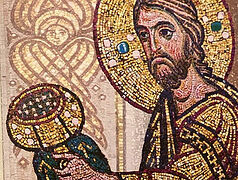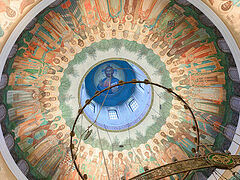This homily was delivered on Palm Sunday, March 29, 1953.
In the name of the Father and the Son and the Holy Spirit.
I greet all of you, God-beloved parishioners of our St. Nicholas Cathedral, with the great feast of our Lord Jesus Christ’s triumphal entrance into Jerusalem.
The Lord went to Jerusalem many times, but always discreetly. He went with a small crowd of His closest disciples. Now, before His sufferings, He goes triumphantly, like a King, like the promised Messiah. The people always loved Him and followed Him, expecting to receive mercy from Him: healing from the most terrible and incurable diseases, deliverance from unclean spirits, consolation in sorrows, and instruction on how to receive eternal life. We know that He fed the hungry, satiating 5,000 men, not to mention women and children, with five small loaves; another time He fed 4,000 men, in addition to women and children, with seven loaves. Therefore, the people loved Him, and even His enemies, the Scribes and Pharisees, didn’t dare openly seize and kill Him, fearing a popular uprising.
Many already recognized Him as the Son of God, the promised King from the line of David Whom all the prophets foretold. But He forbade both the disciples and the evil spirits—whom He cast out with His word and who openly confessed Him to be the Son of God, to speak about it. Now, in view of His sufferings, He shows the people in a special way that He is the Messiah: Approaching Jerusalem, He sends two of His disciples to the nearest village to bring Him an untamed colt upon which no one had ever ridden. The disciples bring an ass with a colt, cover them with clothing, and Jesus sits on the ass and so makes His way towards the city, showing the fulfillment of the prophecy that He is the Christ: Rejoice greatly, O daughter of Zion! … Behold, thy King cometh unto thee … lowly, and riding upon an ass, and upon a colt the foal of an ass (Zech. 9:9).
At that time, six days before Pascha, thousands of pilgrims were heading for Jerusalem. After all, it was the only city in the world that had the only temple of the true God, where the Jews, scattered throughout the world, were to worship Him. Therefore, up to 3 million people would gather there on the feasts of Passover, Tabernacles, and the Dedication. Passover was especially celebrated with solemnity. And so, all these crowds of pilgrims, seeing the Teacher riding on a donkey, surrounded by a crowd of His Galilean disciples, and having heard about the great miracle He recently worked—the resurrection of the decaying Lazarus, who had been dead for four days (which no one had ever done before)—began welcoming Him with shouts of “Hosannah!” Some of them cut branches off of trees and spread them out under the feet of the donkey (and like them, we stand with palm branches in our hands), others took off their robes and, to show their love, spread them out along the road.
And our Lord Jesus Christ came riding, surrounded by a crowd a million strong. Not only the adults rejoiced and sang, but the youths also greeted Him, and even nursing infants were given a voice by the Lord, Who put the words of the Psalms in their mouth that they might praise God together with the adults. And when the Pharisees insisted that Christ forbid the children to glorify Him, He answered them: I tell you that, if these should hold their peace, the stones would immediately cry out! (Lk. 19:40). Such was the joy, such was the rejoicing of the people, because they thought that Christ would be their king.
 But with this universal rejoicing, Christ Himself became more pensive and sadder. Why? Because He knew that in three days, these same people would turn away from Him, and would call for Barabbas to be released instead of Him, and would hand Him over to death. And even His closest disciples would all run away. That’s what happened on Golgotha. Who do we see at His Cross? His Most Pure Mother, who could have left her beloved Son in His misfortune? The Myrrh-bearing Women, who accompanied Him from Galilee, regardless of any dangers, and we know how dear their devotion was to the Lord: After His Resurrection, He appeared to them even before the Apostles. At the Cross we also see Jesus’ beloved disciple, St. John the Theologian. But they’re just a few people out of the million-strong crowd that surrounded the Lord during His entrance into Jerusalem.
But with this universal rejoicing, Christ Himself became more pensive and sadder. Why? Because He knew that in three days, these same people would turn away from Him, and would call for Barabbas to be released instead of Him, and would hand Him over to death. And even His closest disciples would all run away. That’s what happened on Golgotha. Who do we see at His Cross? His Most Pure Mother, who could have left her beloved Son in His misfortune? The Myrrh-bearing Women, who accompanied Him from Galilee, regardless of any dangers, and we know how dear their devotion was to the Lord: After His Resurrection, He appeared to them even before the Apostles. At the Cross we also see Jesus’ beloved disciple, St. John the Theologian. But they’re just a few people out of the million-strong crowd that surrounded the Lord during His entrance into Jerusalem.
Let’s fast forward to our time. You have gladdened my heart, coming here in such large numbers yesterday evening and today. But will it be the same tomorrow and the day after when we remember the sufferings of Christ, or will you also turn into just a handful of faithful, as at Golgotha? May it not be so! Will you really, for the sake of your household affairs, leave the Sufferer alone and not share in His sorrows, not respond to His call?! It used to be that all the cooking and preparations for the feast would prevent us from going to church at times. Now, thank God, this reason has also disappeared! So, leave all your affairs behind! They are such that as soon as you finish one, another immediately demands your attention, and there will never be an end to them!
I’d like to know that you’ll be coming all week in the same numbers as you are, to worship the Passion and Tomb of Christ, to then all enter together into the joy of the Holy Resurrection of Christ! May this, by the grace of God, be so with all of us!
Amen.




